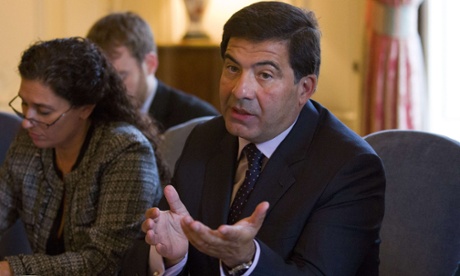
Argentina is seeking to repatriate $3.5bn it claims HSBC secretly helped clients funnel into offshore accounts to evade tax.
Ricardo Echegaray, head of the Argentinian tax authority, Afip, said in London on Monday that his officials had identified 4,040 undisclosed bank accounts held by Argentinian individuals and companies in Switzerland through HSBC’s Geneva subsidiary.
Afip has already begun legal proceedings in Buenos Aires against the individual HSBC account holders for criminal tax evasion, but Echegaray said the authority would also be seeking redress from HSBC’s holding company for facilitating tax evasion through its Argentinian and Swiss branches.
The latest revelations emerged on the day directors of HSBC were facing a grilling by a committee of British parliamentarians over the bank’s role in facilitating tax evasion and alleged money laundering.
A joint investigation by the Guardian, the BBC, Le Monde and other media outlets into a cache of documents obtained by a former employee of the bank found that it had turned a blind eye to illegal activity of wealthy clients and arms dealers.
The Argentinians said they were applying for an international arrest warrant for a UK-domiciled Argentinian accountant, Miguel Abadi, who they allege funnelled $1.4bn offshore through a single London-based investment fund called Gems Advisors [see footnote].
HSBC said in a statement it had been “cooperating fully with Argentine regulators, including the tax authority and the judiciary, since allegations were first made public last year, and we will continue to do so”.
Abadi’s spokesman said: “Mr Abadi and Gems Advisors have never had any access to any private Argentinian funds. The funds belong to investors who are banks, pension funds and insurance funds. He has offered full cooperation to the Argentinian authorities, and has not been made aware of any arrest warrant.”
According to Echegaray, HSBC’s subsidiary in Argentina designed a platform to help clients hide funds in Swiss accounts. Outside lawyers and accountants set up “ghost” networks of offshore companies, to make the transfers even more opaque. Afip has made formal requests for information on the networks behind the Swiss accounts to the authorities in Bermuda, the British Virgin Islands, and Uruguay as well.
Afip has raided the Argentinian branch of HSBC and seized records and files, but was told many documents relating to the Swiss accounts had been stored at a facility which suffered an arson attack last year.
Around 15% of the 4,040 account holders had changed their tax returns and declared offshore accounts since the Afip investigation was made public, the authority said.
The Argentinian authorities were given the data on the secret Swiss accounts by the French government, which had itself received them from whistleblower and former employee of HSBC in Switzerland Hervé Falciani.
The same leak led to investigations in Belgium and France. The French authorities have recovered £188m in taxes and fines from a list of 3,000 clients and Spain has recovered £220m, also from 3,000 clients.
HMRC has faced criticism for prosecuting just one out of the 1,000 individuals. The permanent secretary for the revenue, Edward Troup, was also scheduled to appear before MPs on the public accounts committee on Monday.
• This footnote was added on 12 January 2016 and updated on 16 February 2016. Representatives for Miguel Abadi have pointed out that the application by Afip for an arrest warrant was rejected by the Argentine judiciary. Further, the allegations against Abadi are denied and have not been substantiated. Mr Abadi has voluntarily provided information to the Argentine authorities.

